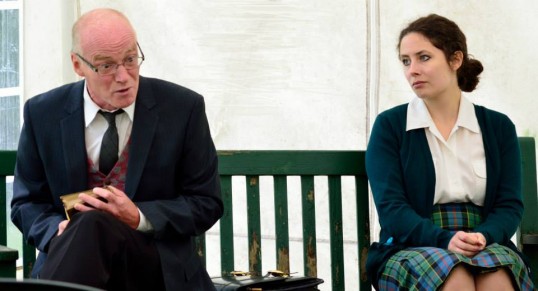Scots Double Bill
✭✭✩✩✩ Stormy feminism
Duddingston Kirk Manse Gardens (Venue 121) Tue 5 – Sat 16 August 2014
In a feminist journey that attempts to bring substance to two Shakespearean women, Theatre Alba’s production of this Scots Double Bill will certainly give pause for thought, though not necessarily as might be expected.
Staged in a marquee in Duddingston Kirk Manse Gardens, away from the hustle and bustle of the city, Theatre Alba delivers an alternative view to two of Shakespeare’s great tragic heroines: Cordelia the virtuous, loving and sacrificing daughter in King Lear; and Ophelia, the sweet and innocent young girl driven to madness and death in Hamlet.
Concerned about the depiction of female characters in fiction, Joan Ure penned two short plays, Something in it for Cordelia and Something in it for Ophelia in the 1970s to challenge opinions about the unequal status of male and female characters. Each of these plays moves the title women from the periphery to centre stage in an attempt to liberate their characters from their roles as victims.
But in this production, it feels like something has been lost along the way.
Each story tells of an encounter in Waverley train station. The first, between father and daughter, feels oddly like fan fiction. The second is between two strangers as they enter an almost high-school dissection of a production of Hamlet they have both seen.
Something in it for Cordelia begins with an old, infirm, impoverished King of Scotland. In a confusing discussion, where there is some ambiguity over whether the actors are playing Lear and Cordelia, or the actors are playing actors from a King Lear fringe show, it seems that Cordelia has saved her father and in doing so is now doomed to look after him forever.
expressive, emotional and touching
Charles Donnelly plays King Lear with equal degrees of grumpiness and good-natured huffiness, while Amy Conway plays Cordelia as a patronising, angry and exasperated child. Cordelia no longer feels like a victim, but neither does she have any redeeming quality. The piece seems to trivialise and demystify the tragedy, bringing it down to a familiar everyday argument. It is unclear whether this is Joan Ure’s original intent or Clunie MacKenzie’s direction of this production.
Something in it for Ophelia, then, sees Hannah (Angela Cassidy) and Martin (John McColl), also sitting in Waverley station. McColl is an inspiration, easily the highlight of the Double Bill; he is expressive, emotional and touching as the cracks begin to take hold.
Where the first play over-identifies with modern society, this one doesn’t quite hit the mark. There seems little congruence or relevance with society today as Helen Cuinn’s direction seems to try – but ultimately struggles – to marry present day with the 1970s vision. In this piece, rather than presenting an inspirational, powerful woman, it is a judgemental, uptight and almost vindictive woman that is shown reducing a man to desolation.
The plays, though rarely performed, are supposed to be full of love for fellow human beings and evoking pathos. However, in a production that contains flashes of brightness, the lasting impression is that of a stormy heath; somewhat particularly apt as the wind outside shakes the marquee.
The overall feel of this production is one of discomfort, with too much emphasis on trying to squeeze in Scottish references and an overarching notion that everyone is out for themselves, no matter what.
Running time: 1 hour 15 minutes
Duddingston Kirk Manse Gardens, Old Church Lane, Duddingston, EH15 3PX (Venue 121)
Tue 5 – Sat 16 August 2014
Daily: 16.00
Tickets: tickets.edfringe.com/whats-on/scots-double-bill
Company website: www.theatrealba.com
ENDS



















